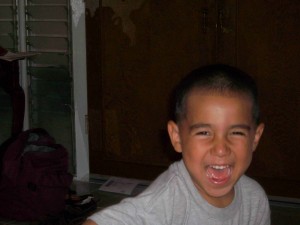 We attended a corned beef and cabbage dinner last night, with Irish soda bread, green milk, Pellegrino in green bottles, and O’Doul’s. A young tenor sang “Danny Boy” and a line of step dancers performed jigs and reels. The evening ended with Mateo onstage, in a green hat, doing high kicks. His new career goal: troupe member of Riverdance.
We attended a corned beef and cabbage dinner last night, with Irish soda bread, green milk, Pellegrino in green bottles, and O’Doul’s. A young tenor sang “Danny Boy” and a line of step dancers performed jigs and reels. The evening ended with Mateo onstage, in a green hat, doing high kicks. His new career goal: troupe member of Riverdance.
Not exactly what some people might expect from a little boy born in Guatemala. But Mateo is American and lives in California. He’d rather eat hot dogs than tamales. He shows no interest in learning Spanish. As much as we try to keep his Guatemalan heritage alive, he has his own strong opinions.
As I watched my son skip joyfully around the stage, I was reminded of an article I read while we were adopting Olivia. The article profiled another adoptive mother nearby who had a daughter born in China. The mom was relating how she did her best to keep her daughter’s ties to China strong—Mandarin classes, Chinese friends, annual trips—but the girl wanted little of it. “What she’s most interested in right now,” her mother said, “is Irish step dancing.”
At the time I thought, “Irish step dancing? For a daughter from China?” Now, I laugh at my own ignorance. Of course Irish step dancing, if that’s what her friends are doing. Our children absorb the world around them, whether that’s ballet, hip hop, violin, or gymnastics. We can expose them to the marimba, or salsa, or weaving, or pottery-making, and hope they show an interest. But our children are individuals with their own likes and dislikes, which for Mateo at five years old, happens to involve intricate dance steps.
I do my best to promote things Guatemalan in this house and will continue to do so. But sometimes, a boy just wants to go Irish.
Tags: adoptive families, Guatemalan adoption, Irish step dancing, Riverdance



 ShareThis
ShareThis
“A boy just wants to go Irish”–Fabulous!
Thanks, Lorrie. Mateo has got it going on.
Maybe Mateo really does identify with his Irish ancestors. Who ever said cultural ancestry needed to be genetic? Makes no sense for cultural identity to be routed in birth, really. It is about life experience. And most of Mateo’s experience is as an American boy, raised in California with an Irish American mom. Because you respect and honor his Guatemalan heritage, he has the freedom to live in the moment. I suspect he will integrate these parts when he is a bt older.
Good point, Doris. I think he does; it’s what’s around him most of the time. I like the idea of his integrating these parts of himself when he is a bit older. Much of the time I feel as if I’m in uncharted territory, but Mateo seems to be adjusting to his reality as if it’s the most natural thing in the world (which of course it is, to him). Thanks for the comment.